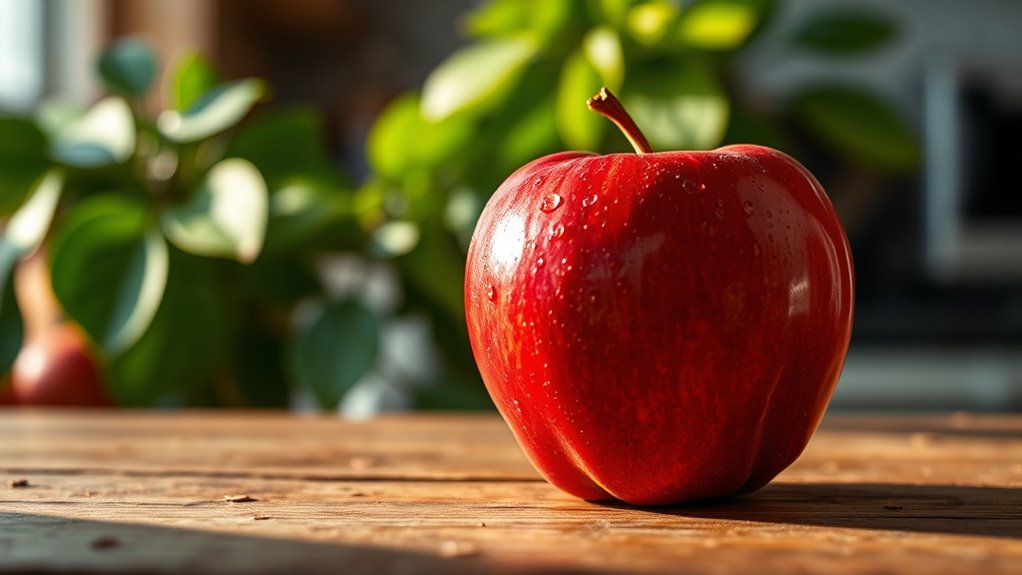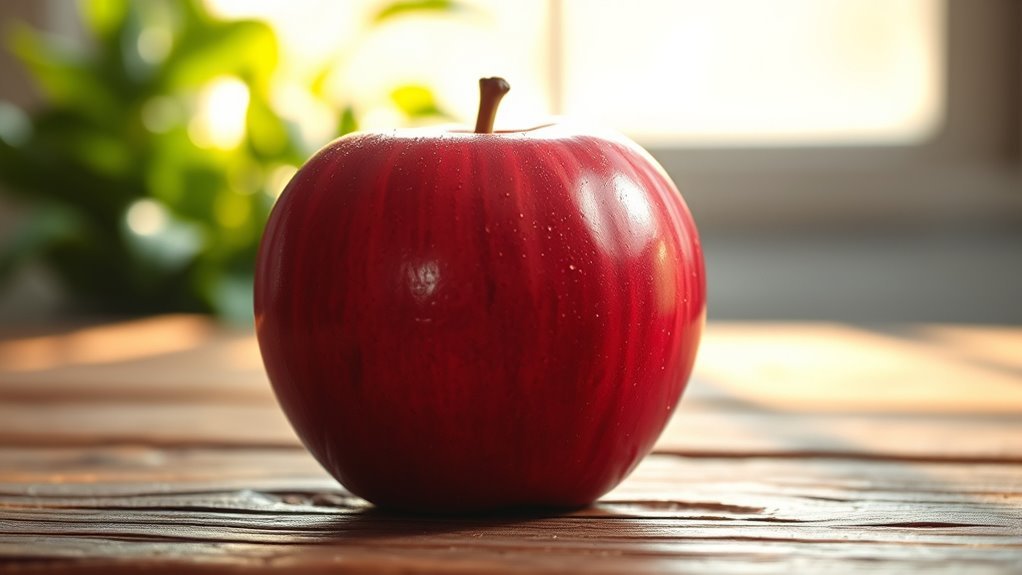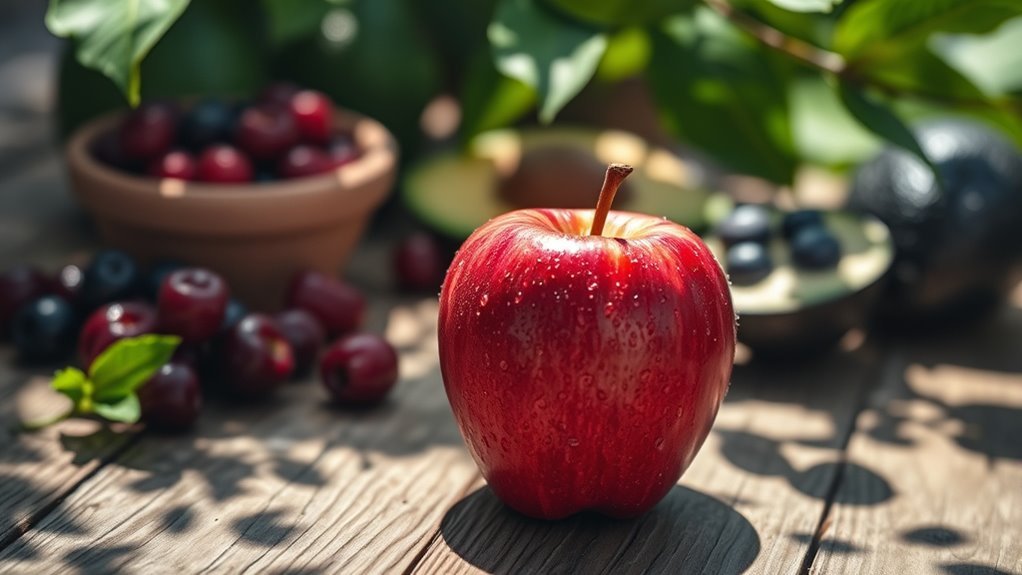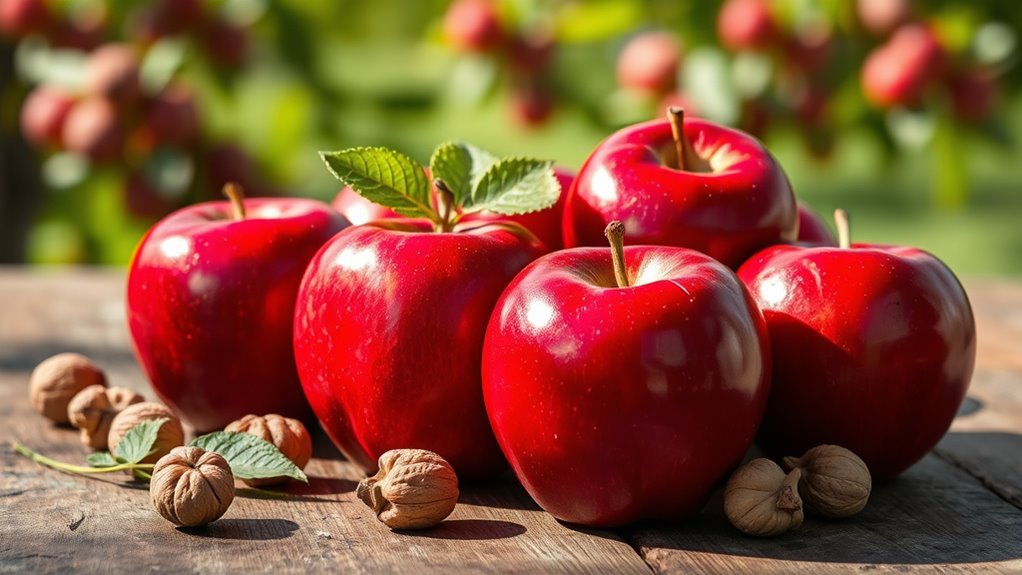Apples aren’t considered keto-friendly due to their high carbohydrate content, averaging 15-25 grams per medium fruit. While they offer health benefits like fiber and antioxidants, eating them in moderation is essential if you’re on a ketogenic diet. Choosing lower-carb varieties, like Granny Smith, can help, but portion control is important. If you’re curious about how to incorporate them into your meal plan or explore alternative fruits, there’s more to discover.
Understanding the Ketogenic Diet

When you immerse yourself in the world of the ketogenic diet, it’s essential to understand its core principles. The keto principles revolve around high healthy fats, moderate protein, and low carb intake. By adhering to these diet restrictions, you shift your body into a state of fat burning, known as ketosis. Effective meal planning is vital, as it helps you navigate carb counting while maintaining nutritional balance. Your food choices should focus on nutrient-dense foods that align with your goals. As you make lifestyle changes, you’ll likely notice improved energy levels and a newfound freedom in how you approach eating. Ultimately, understanding these foundational aspects will empower you to embrace the ketogenic lifestyle confidently.
Nutritional Profile of Apples

Apples are a popular fruit known for their crisp texture and sweet flavor, but their nutritional profile raises questions for those following a ketogenic diet. With various apple varieties available, such as Fuji and Granny Smith, each offers unique tastes and nutritional benefits. Generally, apples are low in calories and contain essential vitamins like vitamin C. One notable aspect is their fiber content; a medium apple provides about 4 grams of fiber, which aids digestion and promotes feelings of fullness. However, despite these benefits, it’s important to take into account the carbohydrate content of apples, as this can impact your daily carb limits on keto. Balancing your apple intake with other low-carb foods could help you maintain your desired dietary freedom.
Carb Content in Apples vs. Other Fruits

When you compare the carb content in apples to other fruits, you’ll notice some significant differences. While apples are moderate in carbs, there are low-carb fruit alternatives that may better fit your ketogenic diet. Remember, portion size also plays an essential role in managing your carb intake.
Apple Carb Comparison
Considering a keto diet often leads to scrutinizing the carbohydrate content of various fruits, and apples are no exception. When you look at different apple varieties, you’ll find that most contain roughly 15-25 grams of carbs per medium-sized apple. For instance, a Gala or Fuji apple tends to have higher carb counts, while Granny Smith apples may have slightly fewer. In comparison to other fruits, apples sit in the moderate range. Berries, like strawberries and raspberries, generally offer lower carb counts, making them more keto-friendly options. If you enjoy apples, moderation is key. Balancing your intake with lower-carb fruits can help you maintain your keto goals while still enjoying the crisp sweetness of apples.
Low-Carb Fruit Alternatives
While apples can be a tasty treat, you might want to explore other low-carb fruit alternatives to stay within your keto goals. Consider incorporating low-carb berries like raspberries and strawberries, or keto-friendly citrus options like lemons and limes. These fruits offer lower sugar content and can satisfy your cravings.
Here’s a quick comparison:
| Fruit | Net Carbs (per 100g) | Fiber (g) |
|---|---|---|
| Apple | 11.4 | 2.4 |
| Raspberries | 5.4 | 6.5 |
| Avocado | 1.8 | 6.7 |
| Coconut Products | 6.3 | 9.0 |
Don’t forget to pair these fruits with healthy fats and protein sources, or enjoy them with fiber-rich vegetables like leafy greens or zucchini noodles for a well-rounded meal.
Portion Size Matters
Although apples are often seen as a healthy snack, their carb content can add up quickly depending on the portion size you choose. A medium apple contains about 25 grams of carbs, which could impact your keto goals if you’re not practicing portion control. In contrast, berries like strawberries and raspberries offer lower carb counts, making them better options for a keto diet. If you love apples, consider serving suggestions like slicing a small apple and pairing it with nut butter for a satisfying treat without going overboard. Knowing the carb content of various fruits can empower your choices, allowing you to enjoy a variety of flavors while staying mindful of your dietary needs.
The Glycemic Index of Apples
When evaluating whether apples fit into a keto-friendly diet, understanding their glycemic index (GI) is essential. The glycemic index measures how quickly a food affects your blood sugar levels. Generally, apples have a moderate GI, typically ranging from 30 to 40, depending on the variety. For instance, sweeter apple varieties like Fuji and Honeycrisp may trigger a higher glycemic response compared to tart options like Granny Smith. This means they can potentially affect your ketone levels more noticeably. While apples can offer health benefits, including fiber and vitamins, it’s important to review their GI, especially if you’re aiming for ketosis. Balancing apple consumption with other low-GI foods can help you maintain your desired carb limits.
Portion Control: How Many Apples Can You Eat?
When considering how many apples you can eat on a keto diet, it’s essential to assess their carb content and serving size. Generally, a medium apple contains about 25 grams of carbohydrates, which can impact your daily limit. By understanding portion control, you can enjoy apples while staying within your keto goals.
Assessing Carb Content
Understanding the carb content of apples is essential for anyone following a keto diet, as it directly impacts your daily carbohydrate allowance. Apples contain about 25 grams of carbs per medium-sized fruit, including natural sugars that can elevate your sugar levels. If you’re carb counting, it’s vital to reflect on how this fits into your overall daily intake. While apples offer vitamins and fiber, their higher carb content can make them less suitable for strict keto followers. To enjoy them without derailing your progress, you might want to limit your intake or choose smaller varieties. Ultimately, knowing the carb content helps you make informed decisions that align with your dietary goals, giving you the freedom to enjoy your choices responsibly.
Serving Size Guidelines
Given the carb content of apples, portion control becomes important for those on a keto diet. While apples are nutritious, their natural sugars can add up quickly, impacting your daily carb limit. A typical serving size is about one small apple, which contains roughly 15-20 grams of carbs. If you’re aiming for strict keto, you might want to limit yourself to half an apple or opt for lower-carb fruits, like berries. Remember, balance is key—enjoying an apple occasionally can fit into a flexible keto lifestyle. Just keep your serving sizes in check, and you can savor the flavors of apples without derailing your carb goals. Portion control is essential for maintaining your desired level of freedom within your diet.
Health Benefits of Apples
Apples are often celebrated for their impressive array of health benefits, making them a popular choice for many diets. Different apple varieties, like Granny Smith and Fuji, not only offer unique flavors but also contribute to your well-being. Rich in fiber, apples can aid digestion and promote satiety, helping you manage your weight effectively. The antioxidants found in apples, such as quercetin and catechin, may reduce inflammation and lower the risk of chronic diseases, including heart disease. Their natural sweetness can satisfy cravings, potentially keeping you away from less healthy snacks. While apples do contain carbohydrates, their overall health impacts can make them a nutritious addition to a balanced lifestyle, as long as you’re mindful of portion sizes.
Alternatives to Apples on Keto
While apples offer numerous health benefits, their higher carbohydrate content can make them less suitable for a ketogenic diet, which typically emphasizes low-carb foods. Fortunately, there are plenty of alternatives that can satisfy your cravings while keeping you in ketosis. Consider incorporating keto friendly berries like strawberries, raspberries, and blackberries. These fruits are lower in carbs and packed with antioxidants. Additionally, you can explore various low carb snacks such as nuts, cheese, or veggie sticks.
Here’s a quick comparison:
| Food | Carbs (per 100g) | Keto Friendly |
|---|---|---|
| Apple | 14g | No |
| Strawberries | 7.7g | Yes |
| Almonds | 10g | Yes |
Tips for Including Apples in Your Keto Diet
How can you enjoy apples without derailing your ketogenic diet? Start by choosing lower-carb apple varieties, like Fuji or Honeycrisp, which tend to have fewer sugars. Portion control is key; consider enjoying a small slice or two as a keto snack rather than a whole apple. Pairing apples with healthy fats, like almond butter or cheese, can help balance your macronutrient intake while satisfying your cravings. You can also incorporate apples into salads or smoothies, ensuring you keep the overall carb count in check. Remember, it’s about moderation and making informed choices. By being mindful of your apple consumption, you can enjoy their flavor without compromising your ketogenic lifestyle.
Common Misconceptions About Fruit on Keto
Many people believe that all fruits are off-limits on a ketogenic diet, but this misconception can lead to unnecessary restrictions. While it’s true that some fruits are higher in carbs than others, it doesn’t mean you have to eliminate them entirely. Keto myths often paint a black-and-white picture of fruit, ignoring that options like berries and small portions of low-carb fruits can fit into your meal plan. Understanding fruit misconceptions allows you to enjoy the benefits of vitamins, minerals, and antioxidants without derailing your goals. Moderation is key, and being mindful of your overall carb intake enables you to enjoy a variety of fruits while still maintaining ketosis. Embrace the freedom to choose wisely!
Final Thoughts on Apples and the Keto Lifestyle
When considering apples in a keto lifestyle, it’s important to weigh their nutritional value against your carbohydrate limits. While they offer vitamins and fiber, their natural sugars can add up quickly. You can still enjoy them in moderation, but make sure to plan how they fit into your overall daily carb intake.
Nutritional Value Overview
Understanding the nutritional value of apples is essential for anyone traversing the keto lifestyle. While apples are packed with vitamins and fiber, they do contain higher carbohydrates compared to other keto-friendly fruits. The carb content varies among apple varieties; for example, a medium-sized Fuji apple has about 25 grams of carbs. This can challenge your daily carb limit on a strict keto diet. However, you can still enjoy apples in moderation, especially when incorporated into keto recipes that balance their carbs with healthy fats. Consider pairing slices with almond butter or using them in savory dishes to enhance flavor without exceeding your carb goals. Ultimately, it’s about finding the right balance that fits your individual dietary needs.
Incorporating Into Diet
While integrating apples into a keto diet can be tricky, it doesn’t have to be entirely off-limits. You can enjoy small portions of apples by incorporating them into balanced meals or snacks. Consider creating apple recipes that combine them with high-fat ingredients, like almond butter or cheese, to keep carbs in check while satisfying your cravings. For keto snacks, try apple slices paired with walnuts or a sprinkle of cinnamon for added flavor without excessive carbs. Just remember to track your servings to stay within your daily carb limit. Ultimately, moderation is key, and with a bit of creativity, you can enjoy the fresh taste of apples while maintaining your keto lifestyle.
Frequently Asked Questions about Apples and the Keto Diet
1. Are apples keto-friendly?
While apples are nutritious and packed with vitamins, they are relatively high in carbohydrates compared to other fruits. A medium-sized apple contains about 25 grams of carbohydrates, which can take up a significant portion of your daily carb allowance on a strict keto diet. Therefore, while you can include small amounts of apples in a keto diet, they should be consumed in moderation and accounted for within your daily carb limit.
2. What are the carb counts of different apple varieties?
Different apple varieties have varying carbohydrate counts. For example, a medium-sized Granny Smith apple contains around 20 grams of carbohydrates, while a Honeycrisp apple can have approximately 25 grams. If you are considering incorporating apples into your keto diet, opt for lower-carb varieties like Granny Smith and limit your portion size to stay within your carb goals.
3. Can I enjoy apples on a keto diet in small amounts?
Yes, you can enjoy apples in small amounts on a keto diet. If you choose to have a small slice or a few thin slices of apple as part of a meal or snack, it can add flavor and nutrients without significantly impacting your carb intake. Just be sure to track your carbs throughout the day to ensure you stay within your target range.
4. What are some keto-friendly alternatives to apples?
If you’re looking for keto-friendly fruit alternatives to apples, consider options such as berries (like strawberries, raspberries, and blackberries), avocados, and olives. These fruits are lower in carbohydrates and can provide similar nutritional benefits without as much impact on your carb count, making them more suitable for a ketogenic diet.
5. What are the health benefits of apples, even on a keto diet?
Apples are a good source of fiber, vitamin C, and various antioxidants. They can support digestive health, boost the immune system, and may even help regulate blood sugar levels. If you choose to include apples in your diet, even on a keto diet, you can still benefit from their nutritional value. Just be mindful of your portions to maintain your dietary goals.
References
- https://www.healthline.com/nutrition/keto-diet-food-list#fruits
- https://www.ncbi.nlm.nih.gov/pmc/articles/PMC7072944/
- https://www.mayoclinic.org/healthy-lifestyle/nutrition-and-healthy-eating/in-depth/keto-diet/art-20470137
- https://www.cdc.gov/healthyweight/healthy_eating/fruits.html
- https://www.webmd.com/diet/what-is-the-keto-diet
- https://www.nutrition.gov/topics/whats-food/nutrition-basics/fruits-vegetables
- https://www.health.harvard.edu/staying-healthy/the-ketogenic-diet
- https://www.usda.gov/topics/food-and-nutrition/food-safety-and-nutrition
- https://www.verywellfit.com/keto-friendly-fruits-4174071


